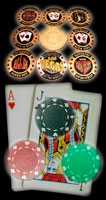CHARACTERISTICS OF POSITIONS
The first step in playing winning poker is simple to not play too many hands.
You should only select hands that figure to be the best, stick with situations where you have an edge.
This need to restrict your play to only those hands in which you have an advantage means you won’t be able to play many hands when you’re one of the early players to act.
Generally you just don’t have enough information.
The more information you have about the strength, or lack of strength of, of other players’ hands, the better an evaluation you can make about the strength of your own hand.
Remember though, hand strength doesn’t just come from being the best draw.
Which is the more important source of strength depends entirely on game conditions.
In all poker games, and Holdem in particular, your hand selection should depend on your position in the betting.
What Is Position?
At every betting round, players act in turn.
The first to act is at a large disadvantage because his action takes place before he has any information about the strength of other players’ hands.
That is what we mean by positional value.
The first player to act has a reduced hand value because of his lack of information, and the last player to act has an increased hand value because he has more information available before he has to act.
Every time another player acts (folds, calls, bets, or raises) you get information about the value of his hand, and, accordingly, the value of your hand.
Accurately evaluating that information is, of course, another story.
Risks of Early Position
The first player to act has to do so with no information about the hands the other players hold.
In a typical ten-handed game, the under-the-gun player has to decide whether to bet or fold while facing a field of nine other players who has given no indication of the strength of their poker hands.
The table on page 135 summarizes the effects of this lack of information on the decision to open the betting.
Note that the percent of hands you can safely open with goes up meaningfully only after four or five players have folded.
Pick the Right Table / Picking a Seat / Theories of Poker / Betting Theory: The Odds
A Theory of Starting Hand Value
A Theory of Flop Play: Counting Outs and Evaluating Draws
The Dynamics of Game Conditions / Table Image / Player Stereotypes
Women and Poker / Spread-Limit Games / Double Bet on the End Games / Kill Games
Short-handed Games / Tournaments / No-limit and Pot-Limit Poker



